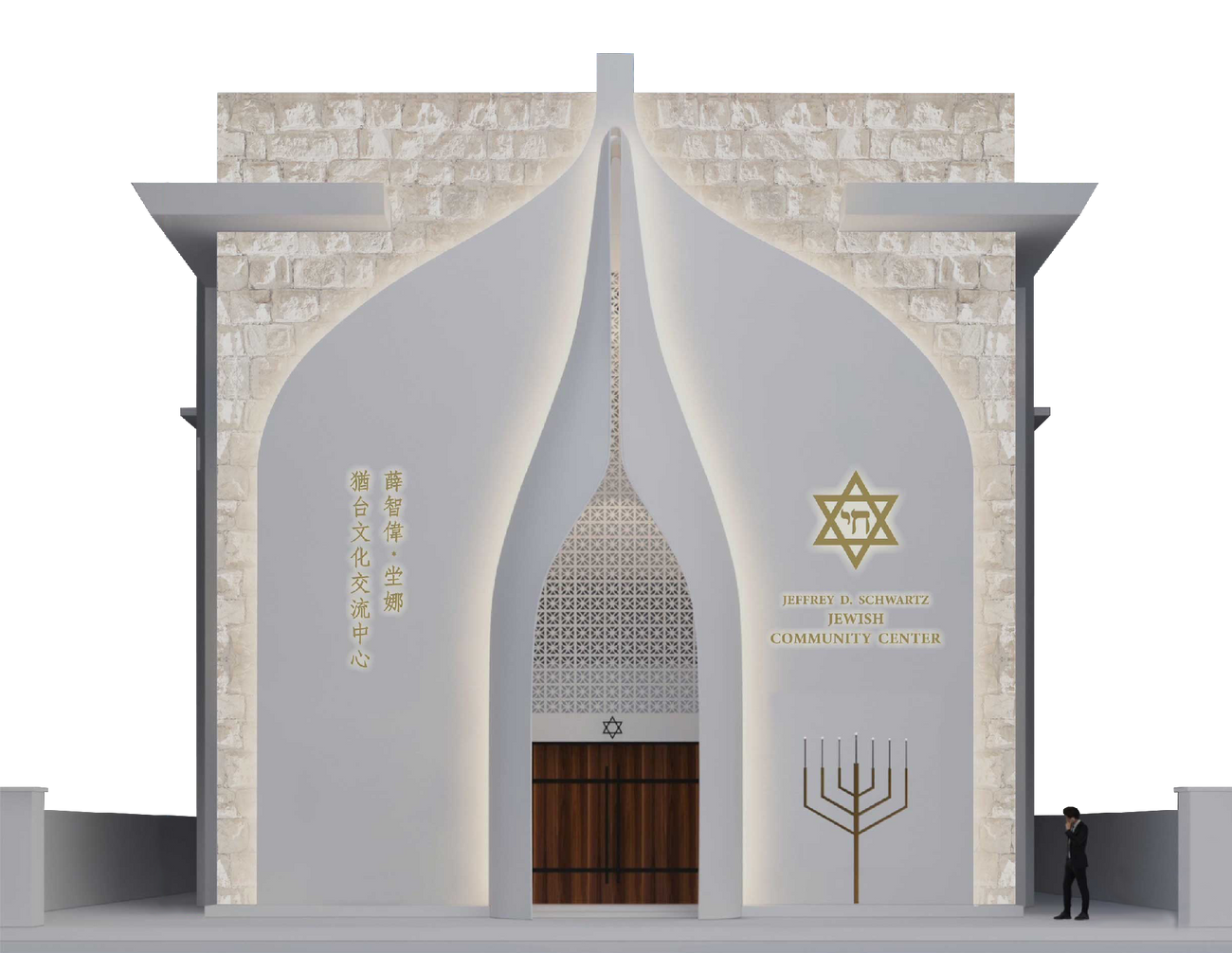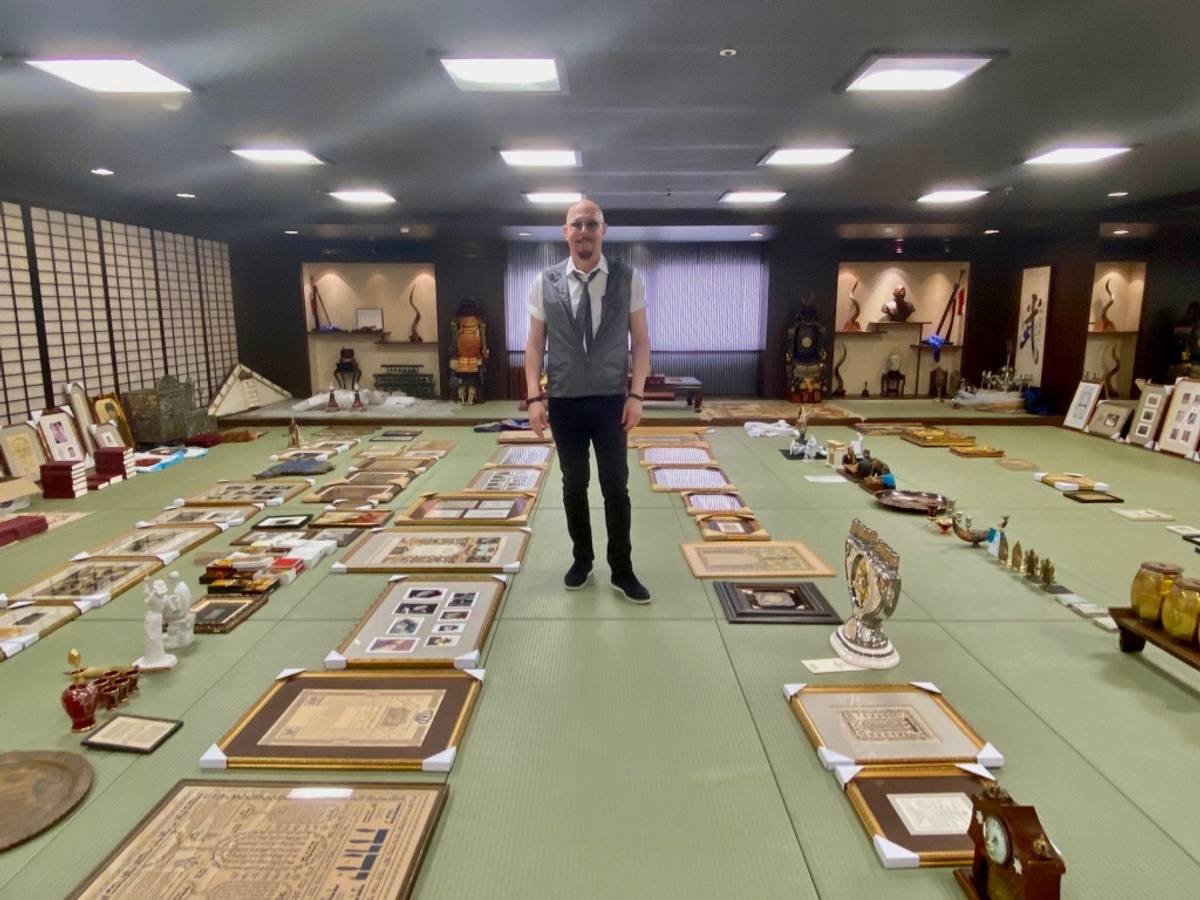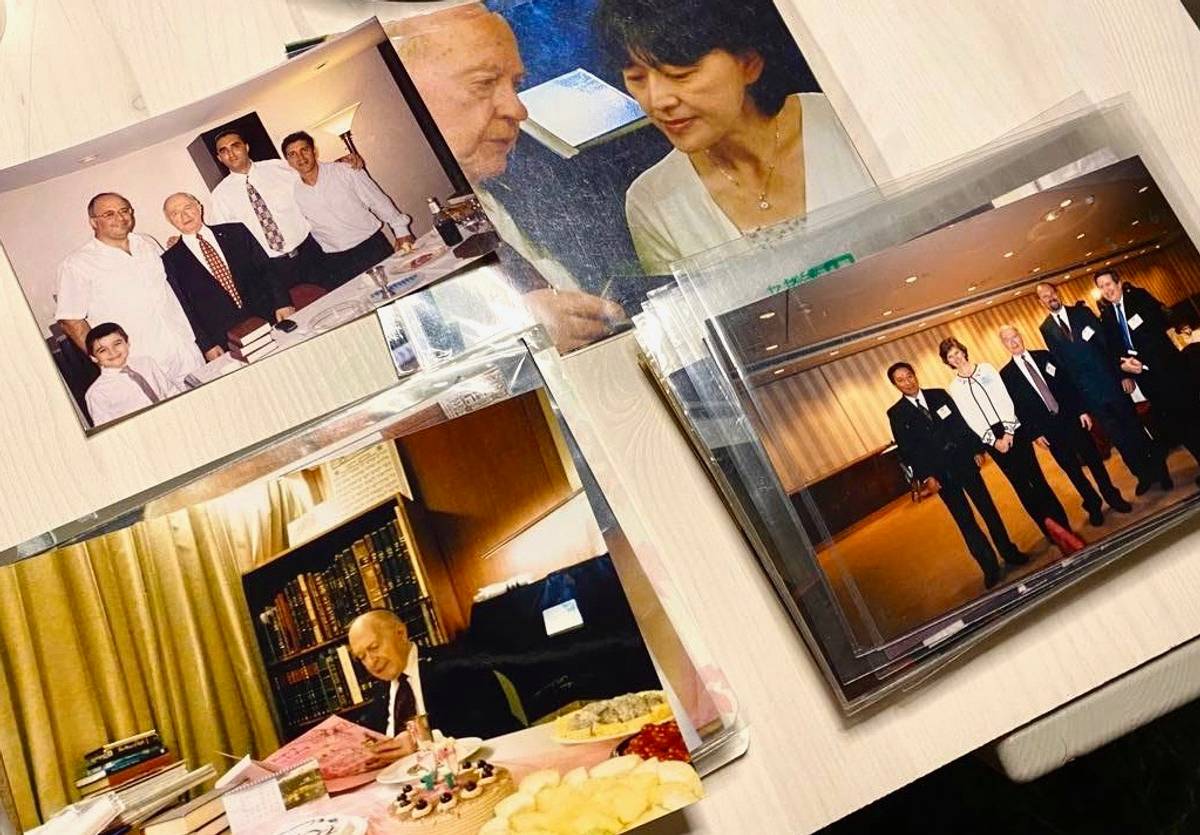Can a New Shul Unite Taiwan’s Jews?
Taipei’s first Jewish Community Center, with a new synagogue, opens this month. Its generous benefactor hopes to unite the tiny community there, but Jews in Taiwan are like Jews everywhere. They have issues.



Jeffrey Schwartz, 70, likes to say he is more Chinese than American. Raised a Conservative Jew in Cleveland, his Mandarin is perfect, but his Hebrew could use some work. His children, who are half-Taiwanese, are proud of their Jewish roots. For the past 50 years, he has made his home in Taiwan, where he made his fortune distributing retail products to American superstores through the Fourstar Group, a merchandising and product development company he founded in 1975. But he also wanted to be remembered as more than just another businessman. He wanted to give back to his community.
The result is the Jeffrey D. Schwartz Jewish Community Center, set to open in Taipei at the end of December. Funded with millions of his own dollars and supported through his own nonprofit organization, the Jeffrey D. Schwartz & Na Tang Jewish Taiwan Cultural Association, Schwartz hopes to be Taiwan’s Sassoon or Kadoorie, another “Rothschild of the East.” What he wants is a Jewish legacy in Taiwan, he told me, “something that I’ll be proud to bring the president of the country over to.”
The $16 million complex will serve a community of fewer than 1,000 Jews on an island of over 20 million people. The building, which will feature a 300-person banquet hall and a synagogue, was designed with influences from the Middle East. Classes will be held and kosher meals will be served in elegant spaces filled with Schwartz’s vast personal collection of Judaica. The center’s mikvah has gold-plated ceilings, its walls adorned with prayers in Hebrew, Chinese and English and a mosaic mural of Moses splitting the seas.
But beyond the initial excitement, Schwartz’s project has intensified a familiar Jewish conflict. A group within Taipei’s tiny Jewish community says it refuses to be part of the community Schwartz is hoping to create; they believe it will become “the hub of Jewish life,” as the website bills it, only for a select group of people, because of the new synagogue’s Orthodox nature. Schwartz chose Chabad Rabbi Shlomi Tabib, who moved to Taiwan with his family in 2011, to lead the new center’s religious activities. Rabbi Tabib insists on strict adherence to Chabad’s Orthodox rules, including those concerning mixed marriages, conversions and b’nei mitzvah.
“I’ve heard criticism over myself, just because I’m here in Taiwan, why do I have ‘very low tolerance’?” Rabbi Tabib said. “It’s not about tolerance. It’s a part of our rules ... this isn’t my rules, I follow the authentic path that our forefathers went. And that’s what [has] preserved Judaism.”

The Conservative Taiwan Jewish Community (TJC), Taiwan’s only other recognized Jewish group, has been invited to partake in activities at the JCC and use its space for activities, but they cannot host their own religious services in the synagogue when it is being used for Chabad services.
“[They] can use the temple with song and dance and whatever they want on Saturday night or on Sunday, we just can’t do it on Friday night. You know, that’s the rule I agreed to with the Chabad,” Schwartz said.
“To me, it has literally sliced the community in half,” said Stephen Schechter, who has worked in the garment industry in Taiwan and other countries across Asia for more than 20 years. “I think it’s wrong.” Schechter is a former supporter of Chabad in Taiwan, but his loyalties now lie with the TJC. He says he and his wife, who is Taiwanese, and their son have been “looked straight through” by Chabad rabbis in Asia throughout their search for Jewish life abroad.
Chabad “emissaries,” bearded rabbis and their sheitel-wearing rebbetzin wives, followers of the late Lubavitcher Rebbe who move their families to strange places to do mitzvot, align closely with Halachic law and maintain strict definitions of what it means to be a Jew: either your mother was Jewish, or you converted under a year-plus-long Orthodox process.
Schwartz’s intentions have always been to create a single inclusive home for Taiwan’s Jews where they can celebrate their culture together, and share that culture with the wider Taiwanese community. Yet relations between the two groups remain fraught. It’s like the old joke about the Jew stranded on a desert island. He has built two synagogues for himself: one to pray in, and one that he refuses to set foot in.
Benjamin Schwall, current president of the TJC, won’t label Schwartz’s project a “community center” at all. “It’s for everyone except your children,” he says, if they’re not considered Jewish. “It’s for everyone as long as you don’t want to have bar mitzvahs.” His wife, Emmy, whom he met in Taiwan as a young businessman in the 1990s, underwent a Conservative conversion to Judaism before the two married in the United States. Their four children have been raised Jewish in Taiwan. But children of mixed marriages, if both parents aren’t Halachically Jewish according to a properly accredited Orthodox rabbi, won’t be able to be bar or bat mitzvahed in the new synagogue.
“They say I’m building a Chabad house,” Schwartz said. “It’s not a Chabad institution. It’s a Jewish community center. I feel very bad if they feel that they’re not welcome ... everybody is welcome, whether they want to be welcomed or not.”
Taiwan’s earliest known Jewish community was made up of families of the U.S. Taiwan Defense Command and other foreigners who used the chapel on Taipei’s military base starting in 1954. Services were mostly lay-led, with occasional visits by a regional traveling rabbi. When it looked like U.S. talks with the People’s Republic of China might lead to a loss of access to their military chapel, a group of Jews registered with the Taipei city government as the Taiwan Jewish Community (TJC) in 1978. A year later, the military chapel was closed, and the Jews took their Torah with them and began holding events in a series of rented spaces.
In 1975, a pivotal figure arrived: Rabbi Ephraim Einhorn, who created a separate religious congregation that met at the President Hotel in Taipei. Einhorn, who died this year at the age of 103, at first kept his flock separate from TJC activities, but in 2001, the two groups finally merged.
Einhorn remained the island’s only resident rabbi until 2011, when Tabib arrived. Originally, Tabib’s intention was to assist Einhorn, but Einhorn remained the star of his own show: Much to the surprise of many, he continued to carry out his own services without missing a single Shabbos well into his late 90s. Only a small handful would attend, usually not enough for a minyan, and about half were Taiwanese Christians.
Taiwan’s Jews, like Schwall and Brett Aaron, an American founder of a food and beverage company who has lived in Taiwan since the 1990s, were hungry for more Jewish life, especially as they began to start their own families. So Tabib set up a Chabad house.
“There was nothing here,” Tabib remembers. “The Jews used to congregate twice a year at Passover and Rosh Hashanah. But Purim, Hanukkah, Shavuot, Sukkot ... nothing was really here.”
“I remember [Tabib] coming,” Aaron said. “And I remember him being very passionate. Also very excited to be here, and I figured, oh, this is great, you know?” Aaron helped Tabib where he could, serving on Chabad’s board and offering accounting help through his company. Tabib filled a major gap: He opened a Sunday school, imported more kosher meat, and brought Jews out of the woodwork for Shabbat services.
When Aaron’s son was born, in early 2019, he wanted the boy to have a ritual circumcision. His wife wasn’t a Jew, but he had hoped Tabib might help him find a mohel in the area. When Tabib said he didn’t know anyone who could help, Aaron said he went through contacts in Australia, Singapore, and Hong Kong until he found someone to conduct the ceremony who, it turned out, had known Tabib. Aaron was upset: “I said to him, ‘I do not believe I could ever be part of your congregation, because you would never recognize my wife, and you will never recognize my son.’” Tabib declined to comment on Aaron’s situation.
Aaron stepped down from Chabad’s board that same year. By this time, Schwartz had already started making preparations for the new center, partnering with Tabib as its rabbi. Schwartz didn’t have much choice, since there were no other rabbis living in Taiwan, apart from Ephraim Einhorn, who was by that point 100 years old.

“I really thought I’d be the last guy promoting Orthodoxy,” Schwartz told me when we met at his office, surrounded by eclectic Jewish artifacts that would soon be housed in the new building. “But I feel better building a center where I hire somebody, and he’s gonna be here for the rest of his life.”
Like Aaron, other Jews who ventured over to Taipei’s Chabad have found that their non-Jewish partners sometimes felt unwelcome, or the burden of proving one’s Jewishness to attain a religious ceremony was too heavy. So a small group decided to revitalize the TJC and create a place in Taiwan where diverse families would feel more comfortable to observe. Through Aaron’s new mohel contacts, they found Leon Fenster, a British hazzan who was in Beijing at the time. His personal style, according to Schwall—as well as added events with more food and a welcoming environment—brought new life to the community.
Today, the TJC serves a larger base than Chabad’s. About 200 people attended this year’s TJC Purim party, while at least 100 attended Chabad’s, community representatives estimate. Of married couples who attend TJC events, Schwall estimates that “about 85%” have one Taiwanese spouse, a figure that has grown significantly in the past 30 years; many of those converted to Judaism under Einhorn. “This is the Jewish community of Taiwan,” Schwall says. “The vast majority, or almost all of us, are intermarried.”
But not all intermarried families mind the rules of Orthodoxy. Steve and Taoyun Chicorel have split their time between Taiwan and the U.S. since 2000. Before their recent move back to the States, their daughter, Annabel, had been taking bat mitzvah lessons with TJC’s Fenster, while their son, Philip, had been studying with Tabib in preparation for a full conversion to Judaism.
The couple say they respect Chabad’s rules, and have supported Chabad financially and offered their school as a space for Chabad’s Sunday school classes in the past. “We help each other, we support each other,” Taoyun, a Taiwanese Conservative convert, said. “So I don’t feel like I’m not welcome there.”
She and Emmy Schwall, Ben’s wife, think that, frankly, the whole conflict is a bit ridiculous. “To me it’s crazy,” Emmy said. “To me, the purpose for religion is you should help the people feel safe and comfortable. Not just fighting over who’s number one. That’s not the point.”
The fact that Schwartz’s own wife and children are not Jewish according to Orthodoxy—and, therefore, his grandchildren could not be bar mitzvahed there—doesn’t seem to bother him. “This whole thing, Conservative, Reform, Orthodox, I mean, that’s not my fight, that’s a worldwide Jewish issue, I don’t want to get involved in the middle of it, you can’t win,” he says.
He’s more concerned with what the center will represent. “I’ve taken Shlomi [Tabib] to government meetings,” Schwartz said, and “he comes in and everybody’s kind of like, ‘Oh, that’s a Jewish person, you know?’ You bring somebody else in that’s too modern, I think it’s confusing.”
“See, in America ... first came the people, and then came the rabbis. To a certain extent, in Asia, the rabbis have come without the people,” Rabbi Dr. Asher Oser, the Yeshiva University-trained Orthodox rabbi of Hong Kong’s Ohel Leah since 2010, said in a study on Jewish communities in China written by Alina Patru. Rabbis coming without an established community often leads to groups splitting off from the main congregation and forming their own, which can be a “painful” and “divisive” process, Oser said in an interview with the study’s author.
In time, though, these communities do recover: In Hong Kong today, there’s crossover and collaboration at its own community center.
The new center expects to open its doors by the end of the year. Whether the TJC will remain totally independent of the project as leaders have promised (“a golden calf,” Schwall says), or whether the two sides still might find a way to bridge the divide, remains to be seen.
Tabib remains optimistic. “It’s not going to make that separation within the community, like some people think it will,” he said. “Once it’s up and running, people will see that it’s feasible and doable. They’ll be happy to be affiliated with it.”
Jordyn Haime is a freelance journalist based in Taipei. She spent the past year researching Judaism in Taiwan under a Fulbright grant.